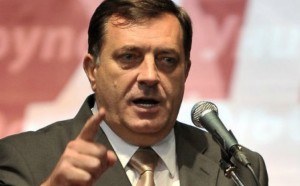Circle 99: Support for the letter to President Biden

Working Group for Bosnia and Herzegovina
__________________________________________________________
President Joseph R. Biden Jr. December 13, 2021
The White House
1600 Pennsylvania Avenue, N.W.
Washington, DC 20500
Dear President Biden,
We are writing to urge you to respond decisively to the threats to Bosnia and Herzegovina’s sovereignty and territorial integrity. It is essential that Bosnian Serb and Bosnian Croat nationalists be prevented from destabilizing Bosnia through their threats of secession or through the further entrenchment of ethnic divisions, developments that would enable the ultimate achievement of the goals of genocide and international aggression from the 1990’s. Further, it is crucial that we support the High Representative who oversees the implementation of the Dayton Peace Agreement. In what follows we analyze aspects of the current crisis and recommend strategic initiatives to defend Bosnia’s sovereignty, to preserve the peace, and to insure a better future for the next generation.
Bosnian Serb nationalist Milorad Dodik, currently a member of the tri-partite Presidency, has recently escalated his efforts to destabilize Bosnia and Herzegovina as well as the region, by simultaneously boycotting national institutions, undermining the constitution, and threatening to form his own army. In his November 5, 2021 report to the United Nations Security Council, High Representative Christian Schmidt warned that such actions would amount to opting out of Bosnia’s constitutional order and from the Dayton framework, and ”would have the practical effect of Republika Srpska’s secession” from Bosnia. The High Representative called these developments a “severe attack” on the Dayton Peace Agreement that undermined any hope for peace and reconciliation in Bosnia.
More pointedly, however, any such move of Republika Srpska toward secession or “autonomy” should be understood and nothing less than a final achievement of its founding genocidal goals. The ICTY Trial Chamber found Radovan Karadžić guilty of being part of a Joint Criminal Enterprise that sought to permanently remove non-Serbs from Bosnian Serb claimed territory and to create an ethnically homogeneous state. Mr. President, on December 13, 1995, you courageously condemned the atrocities as a “Serbian genocidal undertaking” and “raw unadulterated genocide.” You referred to your commitment to Bosnia as a commitment to the value of justice and to the promise that genocide would never happen again. We urge you to fulfill that promise by directing your diplomatic team to insure that Republika Srpska’s genocidal goals will not be appeased.
In addition to the above-mentioned threats to the peace from Republika Srpska, Bosnian Croat nationalist leader Dragan Čović has insisted on electoral reform that would allow for the election of a representative of his nationalist party HDZ (Croatian Democratic Union) to the Presidency. Such a development that would further reinforce ethnic divisions and lead to the creation of a third entity that would further destabilize Bosnia. The creation of a third entity would, moreover, appease the goal of international aggression organized by what has been judged to be a Joint Criminal Enterprise originating in Croatia, a JCE that sought the creation of Herceg-Bosna or “Greater Croatia” in Bosnia. Mr. Čović has been attempting to force an agreement to his election reform proposal by blocking the functioning of the government and threatening to boycott upcoming elections.
We urge you to direct to your negotiating team to reject this proposal for electoral reform and to work with citizens groups to facilitate Bosnia’s transition from a state composed of “constitutive peoples” to a modern liberal democracy of citizens with equal rights and dignity. Indeed, in this regard we request that you direct your negotiating team to be guided by democratic principles and by the rulings of the European Court of Human Rights in the Sejdić – Finci case in 2009 and the Zornić case in 2014.
The nationalist goals mentioned above are being openly supported by the Russian Federation, which sees such destabilizing initiatives by Bosnian Serb and Bosnian Croat nationalists as an opportunity to prevent Bosnia’s Euro-Atlantic integration. Another official statement emphasized that the Russian Federation saw Bosnia as two entities rather than as a single state. Having supported Mr. Dodik’s various referendums challenging the Constitutional Court and the High Representative, a statement was issued recently indicating that the Russian Federation would see Bosnia’s membership in NATO as a hostile act to which it would have to react.
Indeed, Mr. Putin stated recently that the “West was taking Russia's warnings not to cross its “red lines” too lightly.” While this was no doubt a direct reference to the Ukraine, it could just as well be that for Moscow, Republika Srpska will be another Donbass, the next front line of resistance to NATO and the EU.
With Bosnia confronted by threats from Republika Srpska, and with the meddling of the Russian Federation in the region, we urge our diplomats under your leadership to advocate for the reinforcement of EUFOR in Bosnia to a more realistic level, as well as for NATO to undertake contingency planning. Again, we urge our negotiating team to reject the electoral reform proposal designed to benefit Bosnian Croat nationalists in their goal to further destabilize Bosnia and to declare unconditional support for the High Representative in his efforts to resist Mr. Dodik’s bullying provocations and hate speech.
Finally, we believe that the United States of America must respond to Mr. Putin’s “red lines,” with our unwavering commitment to our values of justice, democracy, and human rights, along with our enduring promise to prevent the repetition of genocide and international aggression in Bosnia and Herzegovina.
Sincerely,
The Working Group for Bosnia and Herzegovina
with the following signatories:
David Pettigrew, Ph.D., Professor of Philosophy, Southern Connecticut State University; Member, Steering Committee, Yale University Genocide Studies Program,
Vildana Bijedić, MSc. Mandala Academy Foundation,
Patrick McCarthy, Director Medical Center Library, Associate Dean University Libraries,
St. Louis University,
Djenita Pasic, Attorney at Law, Louisville, Kentucky,
Mirsad Čaušević, Survivor of Omarska and Manjača Concentration Camps,
Kenan Arnautović, M.D., Memphis, Tennessee,
Dr. Adna Karamehić-Oates, Director, Center for Bosnian Studies, Fontbonne University,
Mead Mišić, Attorney, Boston, Massachusetts,
Dijana Mujkanović, Ph.D., Candidate, University of Pittsburgh,
Azem Dervišević, Business and Community Entrepreneur, Cambridge, Massachusetts,
Nerma Bucan, Head of Office/Political Adviser/ Office Prof. Dr. C. Schwarz-Schilling,
Esad Boškailo, M.D., Associate Professor of Psychiatry, University of Arizona, Phoenix Medical School,
Prof. Emir Festic, MD, MS, Ponte Vedra Beach, Florida,
Damir Husamovic, M.Econ., Community Activist, Community Engagement Manager at Cydeo, President at Bosnian Islamic Center of St. Louis,
Jordan Steven Sher, Author of And Still We Rise: A Novel About the Genocide in Bosnia,
Rupert Wolfe Murray, Author,
Peter Lippman, Author of Surviving the Peace: The Struggle for Recovery in Postwar Bosnia-Herzegovina,
Keith Doubt, Professor Emeritus, Wittenberg University
with the support of
Adil Kulenović, President of KRUG 99, Sarajevo,
Mustafa Cerić, Ph.D. , Grand Mufti Emeritus of Bosnia and Herzegovina,
Munira Subašić, President, Association of Mothers of Srebrenica and Žepa Enclaves
Šemso Osmanović, Ph.D., Srebrenica survivor,
Satko Mujagić, Guardians of Omarska, Survivor of Omarska and Manjača concentration camps,
Bakira Hasečić, predsjednica, Udruženje “Žena – žrtva rata”,
Samir Vranović, predsjednik, Udruženja Istina Kalinovik 92,
Halida Konjo-Uzunović, predsjednica, Udruženje žrtava rata Foča 92-95
Jasna Causevic, Genocide Prevention and Responsibility to Protect, Society for Threatened Peoples (STP), Germany
cc. The Honorable Antony J. Blinken, United States Secretary of State;
The Honorable Eric Nelson, United States Ambassador to Bosnia and Herzegovina;
The Honorable Karen Donfried, Assistant Secretary, Bureau of European and Eurasian Affairs,
Office of the United States Secretary of State;
The Honorable Gabriel Escobar Deputy Assistant Secretary, Bureau of European and
Eurasian Affairs, Office of the United States Secretary of State;
The Honorable Matthew A. Palmer Special Representative for the Western Balkans Office
of the United States Secretary of State;
The Honorable Christian Schmidt, High Representative, Bosnia and Herzegovina








